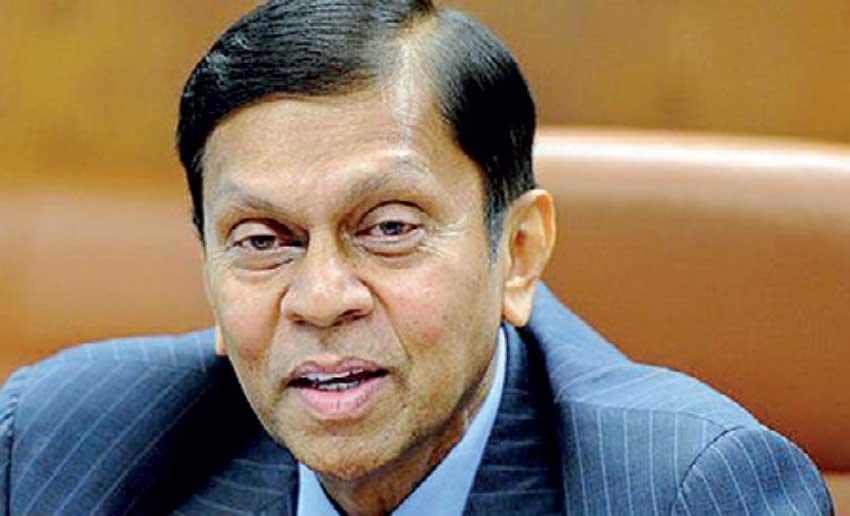26 Oct 2021 - {{hitsCtrl.values.hits}}

Ajith Nivard Cabraal
Pushing back on the claims that the recent bout of inflation is caused by the unprecedented liquidity injections made into the system, the Central Bank said it had recognised the need to shrink its treasury bill holdings in a methodical manner, without disturbing the price and financial system stability.
The holdings of government securities by the Central Bank, which typically represents the printed money stock, started rising exponentially since the onset of the pandemic last year, to provide liquidity to the financial markets and also to finance the budget deficit, when the state revenues significantly declined, due to the pandemic-induced economic restrictions.
Such holdings now stand at Rs.1,469.84 billion, up from as little as Rs.78.21 billion at the end of February 2020, just prior to the economy was forced to shut down as a precaution to stem the deadly virus from spreading within the country from around mid-March 2020.
“The fuel prices have risen not because Sri Lanka prints money. Gas prices have risen not because Sri Lanka printed money. Prices of milk powder have risen not because Sri Lanka prints money,” said Central Bank Governor Ajith Nivard Cabraal, brushing aside claims by certain quarters that the current inflation was a result of excessive money printing.
The prices are soaring around the world in response to supply chain disruptions caused by the pandemic, pent-up demand since reopening of large economies, port congestions and escalation of shipping costs.
Citing multiple sources, the Central Bank showed that the crude oil prices in the benchmark Brent exchange have risen by 62.2 percent year-to-date, LP gas prices have surged by 74.4 percent and coal prices have soared by 202.3 percent. According to the Food and Agriculture Organisation, the global Food Price Index has risen to 130, from less than 100 index points in April 2020. The global wholesale milk powder prices tracked by Global Dairy Trade have risen by 16.8 percent year-to-date and by 40 percent or US $ 1,072 to US $ 3,749 per metric tonne from April last year.
However, Cabraal acknowledged there is an element of increased prices coming from the weaker rupee against the dollar, as Sri Lanka ran into a severe foreign exchange shortage in the middle of the year, which has now brought largely under control.
Defending the stance adopted by his predecessor, Prof. W.D. Lakshman by providing liquidity support to the government and to the markets to maintain the much-needed economic and financial system stability when the crisis unfolded last year, Cabraal said the measure is nothing unique to Sri Lanka but one adopted by over 120 countries around the world.
When the pandemic brought personal and government incomes to a complete standstill, central banks around the world slashed their benchmark interest rates to near zero levels while resorting to bond buying programmes to pump additional liquidity to both markets and governments to meet their spending needs.
The need became more pronounced for countries such as Sri Lankan, which operates with extremely limited fiscal headroom.
“There are instances when you do need to have treasury bill issues to be made in order to ensure that the stability is also maintained,” Cabraal said.
“Sometimes in the interest of financial system stability as well as economic and price stability, there could be instances where additional treasury bills could be issued to the government,” he explained.
In the six-month road map presented at the start of the months, Cabraal said they had recognised the need to shrink the balance sheet without causing undue stress to the financial system or to the prices.
“We do recognise there will come a time where it has to be shrunk as well. So, we will be doing that as well and that has to be done again in consultation with the experts who are here and we will do that accordingly,” he said.
17 Nov 2024 1 hours ago
17 Nov 2024 3 hours ago
17 Nov 2024 5 hours ago
17 Nov 2024 5 hours ago
17 Nov 2024 6 hours ago